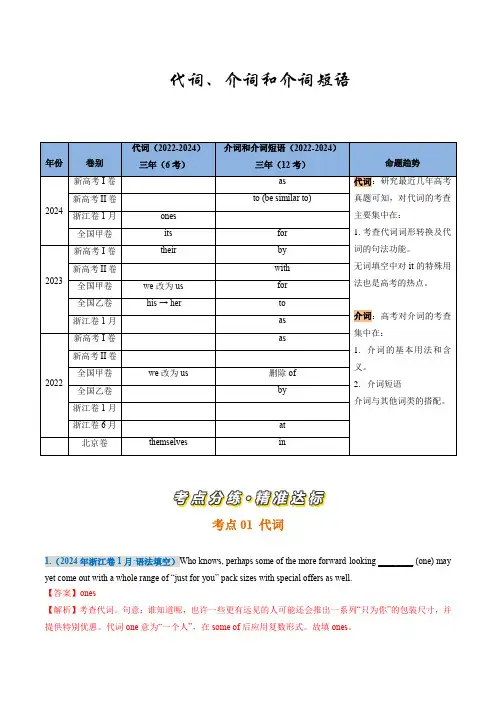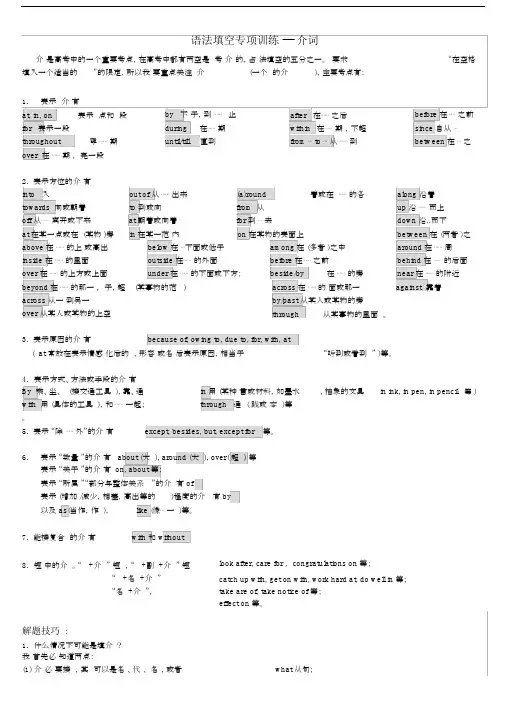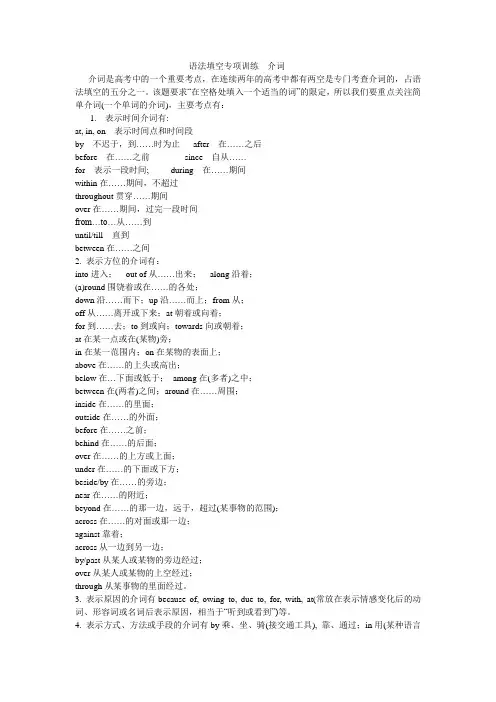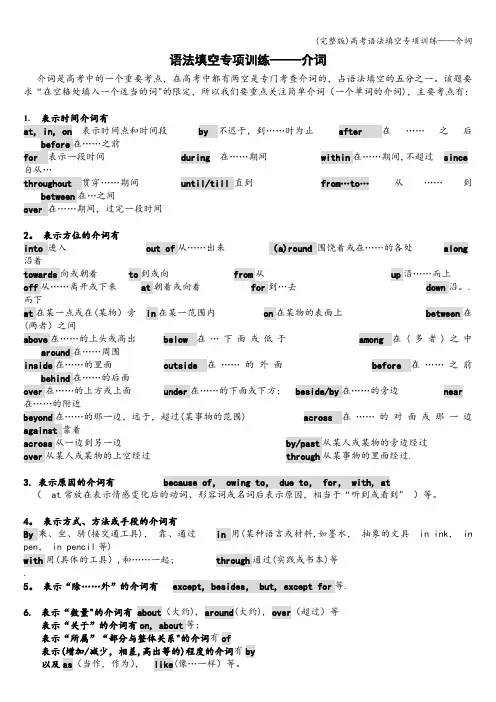高考语法填空常考的介词短语(超给力)
- 格式:doc
- 大小:24.50 KB
- 文档页数:3

让知识带有温度。 第 1 页/共 17 页 高考介词常考短语10.6 高考高频介词汇总About 1.be curious about sth.对某事物感到奇怪 的 2.be about to do…when(刚要做……骤然……);常与when连用 3.bring about 引起,使发生 4.set about 着手,开头做 5e about 发生,偶然 6.hear about 听说,听到有关…… 7.care about 关怀 8.think about 思量 after 1.after all究竟,终究 2.soon after不久以后 Away 1.throw away 丢掉 2.blow away 吹走 3.take/carry away 拿走 千里之行,始于足下 第 2 页 /共 17 页 4.clear away 清除掉 5.pass away 去世 6.wash away 冲走 7.put away 整理好 8.give away 泄漏,赠送 9.wear away 消磨掉 10.break away 挣脱 11.sent away 送走 12.turn away 打发走 against 1.warn sb. against doing sth. 警告某人不要干某事 2.against one’s opinion反驳某人的见解 Back 1.keep back 隐瞒,忍住 2.hold back 控制住 3.call back 回电话 4.look back 回头看 让知识带有温度。 第 3 页/共 17 页 5.give back 回来 6.take back 收回 between 1.between classes 课间 beyond 1.beyond one’s wildest dreams “大大超出某人的预料” 2.beyond reach无法到达 3.beyond the reach超出……范围 4.beyond repair无法维修 5.beyond control无法控制 6.beyond description无法描述 7.beyond the visiting hours 过了开放期 by 1.by nature 天生地 2.by chance偶然地 3.by the back door从后门 4.by the way+从句通过……方式 千里之行,始于足下 第 4 页 /共 17 页 5.by means of通过……的方式 6.(all) by oneself=alone 单独;靠自己;无他人的协助 7.what do you mean+ by that/doing that/saying so?你那样/这样讲(说)是什


语法填空专项训练 --- 介词“在空格填介是高考中的一个重要考点,在高考中都两空是考介的,占法填空的五分之一。
要求入一个适当的”的限定,所以我要重点关注介(一个 ),主要考点:1.at, in, on点和段by 不于,到⋯⋯止after在⋯⋯ 之后before 在⋯⋯之前for一段during在⋯⋯ 期within在⋯⋯ 期,不超since 自从⋯throughout穿⋯⋯ 期until/till直到from ⋯ to ⋯从⋯⋯到between 在⋯之over 在⋯⋯期,完一段2.方位into 入out of 从⋯⋯出来(a)round着或在⋯⋯ 的各along 沿着towards 向或朝着to 到或向from 从up 沿⋯⋯而上off从⋯⋯离开或下来at 朝着或向着for 到⋯去down 沿..而下at 在某一点或在 (某物 )旁in 在某一范内on 在某物的表面上between 在 (两者 )之above 在⋯⋯的上或高出below 在⋯下面或低于among 在 (多者 )之中around 在⋯⋯周inside 在⋯⋯的里面outside 在⋯⋯的外面before 在⋯⋯之前behind 在⋯⋯的后面over 在⋯⋯的上方或上面under在⋯⋯ 的下面或下方;beside/by 在⋯⋯的旁near 在⋯⋯的附近beyond 在⋯⋯的那一,于,超 (某事物的范 )across 在⋯⋯的面或那一against 靠着across 从一到另一by/past 从某人或某物的旁over 从某人或某物的上空through 从某事物的里面。
3.原因because of, owing to, due to, for, with, at( at 常放在情感化后的、形容或名后原因,相当于“听到或看到” )等。
4.方式、方法或手段By 乘、坐、 (接交通工具 ), 靠、通in 用 (某种言或材料,如墨水 , 抽象的文具in ink, in pen, in pencil 等 ) with 用 (具体的工具 ),和⋯⋯一起;伴随through通 (践或本 )等。


高考英语语法填空秒杀思维和技巧专题07 以介词to结尾的相关短语➢以介词to结尾的相关短语掌握这部分才能分清楚什么时候to 后面加do,什么时候to后面加doingbe / get / become used to 习惯于be given to 喜欢;癖好be related to 与…有关系be addicted to 沉溺于;对…上瘾be opposed to 反对devote oneself to献身于;专心于be devoted to 致力于;忠诚于be admitted to 被…录取;准进入be reduced to 沦为reduce…to…使…沦为be attached to附属于;喜欢;依恋be adjusted to 适应be known to 为…所知be married to 和…结婚be sentenced to被判处be connected to 和…连在一起be exposed to 暴露于;遭受be compared to 被比喻成compare… to…把…比作… be engaged to 与…订婚be / become / get accustomed to // accustomed to 惯于;有…习惯be engaged to 与…订婚get down to 着手做lead to 导致object to反对;不喜欢;不赞成put one’s mind to全神贯注于give rise to 引起look forward to 盼望stick to 坚持pay attention to 注意attend to 专心;注意;照料see to 负责;注意contribute to对…作贡献;有助于make contributions to对…作贡献apply oneself to 致力于come close to几乎;将近reply to 回答add to 增加add up to 加起来in addition to除…之外turn to转向;求助于feel up to 能胜任于look up to 尊敬admit to承认belong to 属于take to 喜爱;开始cling to 附着get down to 着手做lead to 导致object to反对;不喜欢;不赞成put one’s mind to全神贯注于give rise to 引起look forward to 盼望stick to 坚持pay attention to 注意attend to 专心;注意;照料see to 负责;注意contribute to对…作贡献;有助于make contributions to对…作贡献apply oneself to 致力于come close to几乎;将近reply to 回答add to 增加add up to 加起来in addition to除…之外turn to转向;求助于feel up to 能胜任于look up to 尊敬admit to承认belong to 属于take to 喜爱;开始cling to 附着fall to 开始respond to 回答;对…作出回应accustom oneself to 使自己习惯于amount to等于prefer… to…更喜欢set an example to 给…树立榜样refer to 谈到;参考;查阅agree to sth. 同意某事(比较:agree to do sth. 同意做某事)prefer… to…更喜欢take / make a trip to到…地方去joi n…to…把…和…连接起来turn a blind eye to对…视而不见turn a deaf ear to 对…充耳不闻show honor to向…表示敬意put an end to(bring… to an end) 结束set fire to 放火烧……drink (a toast) to 为……干杯propose a toast to 提议…… happen to… 发生了……事occur to sb. 想起;想到total up to 总计达be close to 几乎;将近hold to 坚持;抓住help oneself to 随便用……hold on to 抓住;固守do harm to 对……有害处do wrong to 冤枉某人date back to 追溯到when it comes to… 谈到……时come to 来到;达到;结果为(比较:come to do sth逐渐做某事)give an eye to着眼于have an eye to doing 打算the key to ……的答案describe to 向……描述treat sb. to sth. 请某人吃…… trust st h. to sb.把某物委托给某人pay a visit to 参观…… access to 进入;取得的方法be a stranger to 不习惯;对……陌生on one’s way to 在去某处的路上;在达成某事的过程中be kind to 对……和善be important to 对……重要be senior to 年龄长于…… be equal to 和……相等be particular to ……所特有的(比较:be particular about 对……过于讲究;挑剔)be subject to 服从;隶属;易遭\受\患be familiar to 为……熟悉be similar to 和……相似be open to 对……开放be loyal to 对……忠诚be helpful to对……有益处be useful to对……有用be good to sb对某人好(比较:be good for 对……有益处)be bad to 对……不好be bad for(比较:对……有害处)be new to 对……不习惯;对……陌生as to 关于;至于next to(否定词前)几乎;be due to do sth.预定要做某事next to ……的旁边due to 由于;归因于……thanks to 多亏了;由于owing to 由于;因……的缘故in / with regard to 关于in /with relation to 关于;就……而论subject to 在……条件下;依照be given to 沉溺于be related to 与…相关get down to着手做lead to 着手做object to / be opposed to 反对put one’s mind to全神贯注于be equal to 胜任devote oneself to献身于give rise to 引起look forward to 盼望pay attention to 注意lead to通向see to 负责access to 接近(某地的)方法be addicted to 沉溺于… 对…上瘾according to 根据contribute to 为…作贡献;有助于。

高考英语语法常用介词及常用短语搭配1 常用的介词可以分为4类:简单介词(即基本介词,如about, in, on, with等)、合成介词(如into, out of , without等)、成语介词(如according to, apart from, for the sake of等)和分词介词(如concerning, including, respecting等)。 在大学英语四、六级考试的“词汇用法”这部分中,经常考察考生对介词词意及介词与名词、形容词、动词、短语动词等等内容的掌握程度,因为“介词用法”可以说是我们在英语学习过程中遇到的最千变万化的一个内容,有时候某个介词、动词,甚至是一个冠词的不同都可以使整个短语的意思发生改变。因此在记忆时格外困难,很容易使人将其固定搭配或意思弄混淆。 1. 名词+介词 例:1997年1月四级第29题 It is useful to be able to predict the extent _______ which a price change will affect supply and demand. A) from B) with C) to D) for 本题考核介词和名词的搭配用法。空格后是一个定语从句,修饰主语中的名词extent。空格重要求填入一个介词,与extent组成短语,修饰谓语动词affect,表示程度。全句意思是:“能预测物价变动对供求的影响程度,会是很有用的”。extent前要用介词to。 From, with, 以及for 都不能与extent连用表示程度, 所以答案是C。 2. 形容词 + 介词 例:1997年6月四级第59题 By 1929, Mickey Mouse was as popular ________ children as Coca-Cola. A) for B) in C) to D) with 本题考核形容词popular的介词搭配。全句的意思是:“到了1929年,米老鼠和可口可乐一样,受到孩子们的欢迎。”形容词popular后面可接介词with或among,意思是“广受欢迎的”。因此,答案是D) with。介词in在这类句子中可表示“受欢迎的范围”,但不能用in somebody。to有时可以表示"对于……来说",但不能与形容词popular搭配。介词for一般表示事物发生的原因,与全句意思不符合。 例:1996年1月四级第30题 Cancer is second only ______ heart disease as a cause of death. A) of B) to C) with D) from Second在句中作形容词,表示"次于……的"时,要后接介词to,构成词组be second (only)to sth or sb。答案是B。 3. 动词+介词 例:1997年6月四级第52题 He will agree to do what you require ___________ him. A) of C) to B) from D) for 本题主要考核动词require与介词搭配的用法。require something of somebody表示“要求某人做某事”。因此答案是A)。require后面不能接介词to。require后面接介词from可以表示"向某人要某物",不能表示"要求某人做某事"。require后面接介词for时表示"为了"或"供……之用",也不能表示"要求某人做某事"。因此都是错误的。 4. 介词 + 名词 例:1999年6月四级第65题 I was _______ the point of telephoning him when his letter arrived. A) in B) to C) at D) on 答案是D) on。on the point of doing 是固定词组,意思是“正要、打算”。全句的意思是:“当他的信到的时候我正要打电话给他”。 例:1995年6月四级第53题 The survival of civilization as we know is ______ threat. A) within B) under C) towards D) upon 全句意思是:“当今人类文明的生存正在受到威胁”。在4个选项中,只有B) under表示“在……情况下”或“遭到”。is under threat相当于is experiencing threat。所以答案是B) under。within的意思是“在……里面、在……以内”。towards的意思是“向、对”。upon可以表示“在……后立即”,但是不能与threat搭配表示“遭到”之意。 例:1997年1月四级第30题 Finding a job in such a big company has always been _____ his wildest dreams. A) under B) over C) above D) beyond 全句意思:“能在这么大的公司找到一份工作一直是他不敢想象的事”。空格中的介词要与his wildest dreams构成介词短语作句子的标语。答案是D) beyond,意为“超出”,相当于outside the range or limits of someone or something。其它的三个介词都不能和dreams搭配表示“超出”之意。 5. (not…) until的用法 例:1997年1月四级第52题 _______ quite recently, most mothers in Britain did not take paid work outside the home. A) Before B) Until C) From D) Since 从4个选项来看,只有until可以用于副词recently之前。所以答案是B) 。全句的意思是:“英国大多数做母亲的人直到最近才外出从事有偿劳动”。主句谓语若含有否定意义,until表示“直到……才”。如果用since,句子的谓语应当用完成式态have not taken;如果用before,句子是表示在最近之前没有外出工作,至于何时外出工作,可以是最近,也可以是将来某个时候;如果用from,全句意思完全相反,谓语时态也不能用过去时,所以只能选B)。 6. 复合介词 例:1997年6月四级第34题 Every man in this country has the right to live where he wants to ____ the color of his skin. A) with the exception of B) in the light of C) by virtue of D) regardless of 本句意思是:“这个国家里的每一个人,_____他是什么肤色,都有权住在他想住的地方”。空格中应填入“不管、无论”之意的复合介词。可见,答案是D)。其它选项的意思分别是:A) with the exception of(除了……之外),B) because of(由于,鉴于),C) by virtue of(借助、由于)都不适合本句。 7. 四级考试中常考的短语介词 例:1999年1月四级第63题 My father seemed to be in no ______ to look at my school report. A) mood B) emotion C) attitude D) feeling 本题测试短语介词的搭配用法。 本句的大意是:“我的父亲看上去没有情绪看我的成绩单”。be in (no) mood to do sth.为固定搭配,意思是“有(没有)做……的心境”。 例:1991年6月四级第46题 Will all those _______ the proposal raise their hands? A) in relation to B) in excess of C) in contrast toD) in favor of 本句的意思是:“______这项题意的,请举手”。空各处应填入一个表示“支持,赞同”之类的词。答案是D) in favor of。选项A) in relation to意思是:“有关,关于”,B) in excess of意思是:“超过”,C) in contrast to的意思是:“与……相比”,都不合题意。 例:1997年1月四级第48题 ________ one time, Manchester was the home of the most productive cotton mills in the world. A) On B) By C) At D) Of 答案是C) At。介词短语at one time的意思是“曾经、一度”。其它的选项都不能与one time构成短语。 一、常用的介词 about,above,across,after,against,around,at, before,behind,below,beneath,beside,besides,between,beyond,by, down,during, except, for,from, in,inside,into, like, near, of,off,on,out,outside,over, since, through,throughout,till,to,toward, under,until,up,upon, with,without, according to, because of, by way of, in addition to, in front of, in place of, in regard to, in spite of, instead of, on account of, out of. 哇,这么一大堆!别怕别怕,大部份的介词都不难理解,比较令人头痛的只是下列几个 : at, by, to, in, for, of, on, from, with

代词、介词和介词短语考点01 代词1.(2024年浙江卷1月·语法填空)Who knows, perhaps some of the more forward-looking ________ (one) may yet come out with a whole range of “just for you” pack sizes with special offers as well.【答案】ones【解析】考查代词。
句意:谁知道呢,也许一些更有远见的人可能还会推出一系列“只为你”的包装尺寸,并提供特别优惠。
代词one意为“一个人”,在some of后应用复数形式。
故填ones。
preserved for all people of the nation to enjoy-as a national park.【答案】its【解析】考查代词。
句意:这个地方,以其独特而令人惊叹的自然美景,必须被妥善保存供全国人民欣赏。
这里“它们”用形容词性物主代词做定语修饰名词beauty。
3.(2023年全国甲卷改错)In that class, Miss Zhao, our biology teacher, showed we insects on stamps.【答案】we→us【解析】考查代词。
句意:在那节课上,我们的生物老师赵老师给我们看了邮票上的昆虫。
作动词show的宾语,应用宾格us。
故we改为us。
4.(2023年全国乙卷改错)Last Friday my mom decided to color his hair. She studied with all the hair products at the drugstore.【答案】his → her【解析】考查代词。
句意:上周五,我妈妈决定染头发。
此处指“我妈妈染她的头发”,应用代词her。
故his 改为her。
5.(2022年北京卷语法填空)Since people can’t always eat out or cook for ________ (they), they get takeout or order delivery.【答案】themselves【解析】考查反身代词。

语法填空专项训练 --- 介词介是高考中的一个重要考点,在高考中都有两空是考介的,占法填空的五分之一。
要求“在空格填入一个适当的”的限定,所以我要重点关注介(一个的介),主要考点有:1.表示介有at, in, on表示点和段by 不于,到⋯⋯止after在⋯⋯之后before 在⋯⋯之前for 表示一段during在⋯⋯期within在⋯⋯期,不超since 自从⋯throughout穿⋯⋯ 期until/till直到from ⋯ to ⋯从⋯⋯到between 在⋯之over 在⋯⋯期,完一段2. 表示方位的介有into 入out of 从⋯⋯出来(a)round着或在⋯⋯ 的各along 沿着towards 向或朝着to 到或向from 从up 沿⋯⋯而上off 从⋯⋯离开或下来at 朝着或向着for 到⋯去down 沿..而下at 在某一点或在 (某物 )旁in 在某一范内on 在某物的表面上between 在 (两者 )之above 在⋯⋯的上或高出below 在⋯下面或低于among 在 (多者 )之中around 在⋯⋯周inside 在⋯⋯的里面outside 在⋯⋯的外面before 在⋯⋯之前behind 在⋯⋯的后面over 在⋯⋯的上方或上面under 在⋯⋯的下面或下方;beside/by在⋯⋯ 的旁near 在⋯⋯的附近beyond 在⋯⋯的那一,于,超 (某事物的范 )across 在⋯⋯的面或那一against 靠着across 从一到另一by/past 从某人或某物的旁over 从某人或某物的上空through从某事物的里面。
3. 表示原因的介有because of, owing to, due to, for, with, at( at 常放在表示情感化后的、形容或名后表示原因,相当于“听到或看到” )等。
4.表示方式、方法或手段的介有By 乘、坐、 (接交通工具 ), 靠、通in 用 (某种言或材料,如墨水, 抽象的文具in ink, in pen, in pencil等) with 用 (具体的工具 ),和⋯⋯一起;through通(践或本)等。

语法填空专项训练---介词介词是高考中的一个重要考点,在连续两年的高考中都有两空是专门考查介词的,占语法填空的五分之一。
该题要求“在空格处填入一个适当的词”的限定,所以我们要重点关注简单介词(一个单词的介词),主要考点有:1.表示时间介词有:at, in, on 表示时间点和时间段by 不迟于,到……时为止after 在……之后before 在……之前since 自从……for 表示一段时间; during 在……期间within在……期间,不超过throughout贯穿……期间over在……期间,过完一段时间from…to…从……到until/till直到between在……之间2. 表示方位的介词有:into进入;out of从……出来;along沿着;(a)round围饶着或在……的各处;down沿……而下;up沿……而上;from从;off从……离开或下来;at朝着或向着;for到……去;to到或向;towards向或朝着;at在某一点或在(某物)旁;in在某一范围内;on在某物的表面上;above在……的上头或高出;below在…下面或低于;among在(多者)之中;between在(两者)之间;around在……周围;inside在……的里面;outside在……的外面;before在……之前;behind在……的后面;over在……的上方或上面;under在……的下面或下方;beside/by在……的旁边;near在……的附近;beyond在……的那一边,远于,超过(某事物的范围);across在……的对面或那一边;against靠着;across从一边到另一边;by/past从某人或某物的旁边经过;over从某人或某物的上空经过;through从某事物的里面经过。
3. 表示原因的介词有because of, owing to, due to, for, with, at(常放在表示情感变化后的动词、形容词或名词后表示原因,相当于“听到或看到”)等。

语法填空专项训练——-介词介词是高考中的一个重要考点,在高考中都有两空是专门考查介词的,占语法填空的五分之一。
该题要求“在空格处填入一个适当的词"的限定,所以我们要重点关注简单介词(一个单词的介词),主要考点有:1.表示时间介词有at, in, on表示时间点和时间段by 不迟于,到……时为止after 在……之后before在……之前for 表示一段时间during在……期间within在……期间,不超过since 自从…throughout 贯穿……期间until/till 直到f rom…to…从……到between在…之间over 在……期间,过完一段时间2。
表示方位的介词有into 进入out of从……出来(a)round 围饶着或在……的各处along 沿着towards向或朝着to到或向from从up沿……而上off从……离开或下来at朝着或向着for到…去down沿。
.而下at在某一点或在(某物)旁i n在某一范围内on在某物的表面上between在(两者)之间above在……的上头或高出below在…下面或低于among在(多者)之中around在……周围inside在……的里面outside在……的外面before在……之前behind在……的后面over在……的上方或上面under在……的下面或下方;beside/by在……的旁边near 在……的附近beyond在……的那一边,远于,超过(某事物的范围) across在……的对面或那一边against 靠着across从一边到另一边by/past从某人或某物的旁边经过over从某人或某物的上空经过through从某事物的里面经过.3. 表示原因的介词有because of, owing to, due to, for, with, at( at常放在表示情感变化后的动词、形容词或名词后表示原因,相当于“听到或看到" )等。

常见的介词短语高考在高考中,经常会出现一些涉及介词短语的语法题,因此掌握常见的介词短语是十分必要的。
下面列举一些常见的介词短语及其用法,以帮助考生更好地备考。
1. in addition to:除了…之外例句:In addition to studying for the exam, I also need to work on my paper.2. in spite of:尽管例句:In spite of the rain, we decided to go for a walk.3. on behalf of:代表例句:I am here today on behalf of our company to discuss this matter with you.4. in the event of:万一例句:In the event of a fire, please follow the emergency exit signs.5. with regard to:关于例句:With regard to your request, we will do our best to provide you with the necessary information.6. by means of:通过例句:We were able to communicate with our friends in Japan by means of video chat.7. in terms of:就…而言例句:In terms of academic performance, he has shown great improvement this semester.8. in accordance with:按照例句:All employees are required to act in accordance with the company's code of conduct.9. by virtue of:凭借例句:By virtue of his hard work, he was promoted to a higher position.10. in the course of:在…期间例句:In the course of our conversation, she revealed some interesting information about her background.以上是常见的介词短语及其用法,希望考生们能够在备考中多加注意,提高语法水平。
高考60个短语介词值得收藏短语介词与介词短语英语介词是一种没有形态变化,不能单独使用的一种虚词。
英语介词的用法,其难度仅次于英语动词,跟英语动词一样,介词也可以构成短语。
介词短语与短语介词是两个不同的概念,介词短语的词性为介词,在句子中不能单独使用,而介词短语是由介词加上宾语构成,其词性相当于形容词或副词。
高考英语短语介词归纳如下:A1.according to 根据2. ahead of在…之前3. all over遍及4. apart from 除了,(除…以外尚有)5. as for至于;就…方面说来6. as far as 远至,到...程度7. as good as 和...几乎一样8. at the end of在……结尾7. a number of 许多的10. as well as 和……一样11. along with 一道B12. because of 由于13. by means of 依靠; 借助于14. badly off 急缺15. but for 要不是16. due to 由于;因…造成E17. ever since 从那以后18. except for (不同类中的)除此以外F19. far from 远非;远离20. for fear of以免;以防21. for the sake of 为了,为了...的利益I22. in spite of 尽管23. in front of 在…前面24. in regard to 关于;对于25. in terms of根据; 以…为单位26. instead of 而不是;反而27. in need of 需要;缺少28. in favor of赞同; 支持29. in (the )charge of 主管;负责30. in honor of为庆祝;为纪念31. in search of 搜索; 为了寻找32. in touch with与…保持联络33. in accordance with 与...一致,按照34. in addition to 除...之外(还)35. in case of 假如,防备36. in line with 与...一致37. in place of 代替,取代,交换38. in return for 作为对...报答39. in step with 与...一致/协调40. in the course of 在...期间/过程中41. in the event of 如果...发生,万一42. in memory of 为了纪念L43. less than 少于,不到M44. more than 超过; 不只是45. nothing but 仅仅;只不过N46. next to 紧邻; 在…近旁; 仅次于O47. on behalf of 代表48. other than 不同于49. out of . 出于;出自50. on the point of 即将...的时刻51. opposite to在对面52. other than除了;不同于R53. regardless of 不顾54. rather than而不是S55. such as 比如56. short of缺少T57. thanks to幸亏;由于U58. up to 达到;多达W59. with reference to 关于,参照60. with respect to关于,(至于)谈到。
常用介短Part One介 to :1. be accustomed to doing 于2. amount to 达到The cost of the project has amounted to 5 million dollars.3. appeal to呼吁He appeals to people that we should not eat dogs.4. apply to适用于The new solution has been applied to the problem.5. attach to隶属于The high school is attached to Xiamen University.6. attend to照He has to attend to his little brother.7. belong to 属于8. challenge to 向。
挑Teaching is a big challenge to him.9. compare to比成Children are always compared to the flowers of our motherland.10.be condemned to被判刑He is condemned to death for murder.11.confess to承He confessed cheating on the exam.12.confine to限制13.consent to赞成His father would not consent to his going abroad.14.convert to15.be entitled to享有利16.listen to听17.mention to提到18.object to反Their parents object to their marriage.19.occur to突然想到20.prefer to更喜21.react to⋯反22.reply to回答The students made no reply to the teacher’s question.23.respond to响The boy responds to the listening material quickly.24.see to注意I ’ll see to the work when you are away25.submit to遵从于26.surrender to向⋯投诚The criminal surrendered himself to the police.27.turn to向He always turns to me for help.28.yield to向⋯信服/投诚He never yield to the hardship of life.Part TwoAt1. Be amused at ⋯高We were amused at the joke.我得个笑真幽默。
介词短语和动词短语一、常见的介词搭配:1. “介词+名词”型(1) in 构成的短语in advance 在前头,事先,预先in case 如果,万一in charge主管,掌管,看管in common共有,共同,公有in demand有需要的in doubt 感到疑惑的,难以确定的in effect实际上,生效in fact事实上in order按序,井然有序,情况良好;恰当in progress进行中in return作为回报in vain徒劳in turn依次,替换地;相应地,转而(2) on构成的短语on guard 在值勤on leave在休假on holiday在度假on strike罢工on sale出售on loan借贷on the move在移动,搬迁;离开on the march在行军on the go正在活动,正在奔走on the air正在广播(3) beyond构成的短语beyond one's power是某人力所不及的beyond praise夸不胜夸beyond one's reach够不着beyond description难以形容beyond words无法用语言形容beyond doubt无疑beyond one's understanding 无法理解(4) under构成的短语under development 在发展中under observation在观察中under test在测试中under construction在建设中under examination在检查(调查)中under consideration在考虑中under repair在修理中(5) at 构成的短语at length 详细地,长时间at sea茫然at will任意地at work在上班at lunch在吃午饭at rest在休息at table在吃饭at school上学at church做礼拜at peace处于和平状态(6) out of 构成的短语out of breath 上气不接下气out of balance失去平衡out of date过时out of patience不耐烦out of control失去控制out of business破产out of style过时,不时髦out of the ordinary不寻常的out of touch失去联系2.复杂介词型(1) 表示原因(通常在句中作状语), 意为“由于,因为”。
高考语法填空常考介词短语
1. 由at构成的短语
At dawn拂晓 At sunrise日出时 At noon中午 At night夜晚 At table在用餐 At college在上大学 At last最后 At a time一次 At times有时候 At the same time同时 At all costs不惜一切代价 At least至少 At will任意地 At the thought of一想到 At daybreak黎明
At sunset/sundown日落时
At dusk黄昏
At home在家
At school在上学
At risk有危险,冒险
At rest静止不动
At one time曾经
At all time总是
At present目前
At first最初
At most至多
At random随机地
At the sight of一看到
2. 由by构成的短语
By accident/chance偶然 By turns轮流 By check用支票 By mistake错误地 By no means决不 By e-mail通过电子邮件
By credit card用信用卡
By birth出身
By means of借助……手段
By the way顺便说一句
3. 由from构成的短语
From memory凭记忆 From day to day日复一日 From now on 从现在起 From then on从那时起 From bad to worse越来越糟 From cover to cover从头至尾
From beginning to end 从头到尾
From head to foot从头到脚
From time to time时不时地
4. 由in构成的短语
In high/poor/bad spirits情绪高涨/低落/差 In tears热泪盈眶 In fear在恐惧中 In danger在危险中 In peace和平相处 In surprise惊讶地 In trouble陷入困境 In safety很安全 In need有需要 In good order很整齐 In silence静静地 In doubt有疑问 In print在印刷 In a sense从某种意义上来说 In flower在开花 In advance事先
In the meantime同时
In case假使
In case of如果发生
In fact实际上
In general一般说来
In turn 轮流
In public公开地
In short总之
In one’s opinion在某人看来
In no time立刻
In all总共
In brief简而言之
In good condition状况好
In order井井有条
In other words换句话说 In return作为报答 In the course of在……过程中 In the end最后
In the long run从长远来看
5. 由on构成的短语
On board乘(车,飞机) On duty值班 On fire着火 On earth到底 On holiday/vacation度假 On trial在受审 On strike罢工 On show在上映 On (the) average平均 On purpose故意地 On the contary相反 On the way在途中 On call听候召唤
On guard在岗
On foot步行
On hire雇用
On business出差
On sale在出售/在打听
On a visit在访问
On watch在站岗/放哨
On the spot当场
On the rise在上升
On the phone在打/接电话
On time准时
6. 由Of构成的短语
Of+抽象名词=形容词
Of+great / much+抽象名词=very + 形容词
如:It is of great / much value.=It is very valuable.
Of+no+抽象名词=not + 形容词
如:It is of no use.=It is not useful.=It is useless.
7. 由out of构成的词组
Out of breath气喘吁吁 Out of control失去控制 Out of danger脱险 Out of work失业 Out of date过时 Out of fashion不时尚 Out of order发生故障
Out of shape变形
Out of reach拿不到
Out of touch失去联系
Out of the question不可能
Out of question没问题
8. 由to构成的短语
To与情感名词连用,表示“某种行动后产生的感觉”
To one’s delight/surprise/horror/sorrow/joy/reget=to the delight/ surprise /horror /sorrow /joy /
reget of sb.这种表达法表示结果,用作状语,位置前、中、后皆可。为了强调,可在前面加
much,意为“使某人非常……的是”
9. 由with构成的短语
With在英语中用法繁多,其主要用法如下:
(1) 表示“和……在一起”“由……陪同”或“有……在场”的意思。如:
Mr. and Mrs. Smith were there, with their family of three small children .
Would you like to come to the theatre with us ?
You cannot see Mr.Johnson at the moment , as he is with the manager.
(2) 表示两种事物之间的相应关系或齐头并进的意思。如:
With time passing,they have grown into big boys and big girls .
Temperature varies with the time of the year.
(3) 表示“带有、带来、带走、携带”等伴随的意思。如:
The waiter arrived with a cup of coffee.
He came downstairs with his coat over his arm .
(4) 引导一个表示方式的状语附加语。如:
The stranger spoke with a foreign accent .
He looked at me with a frown .
同样用法的有:
with a sneer嘲笑地,with a sign唉声叹气地,
with a sob抽噎地,with a laugh哈哈一笑,大笑着
(5) 指原因或理由。如:
His face was red with anger.
The small child trembled with fear.